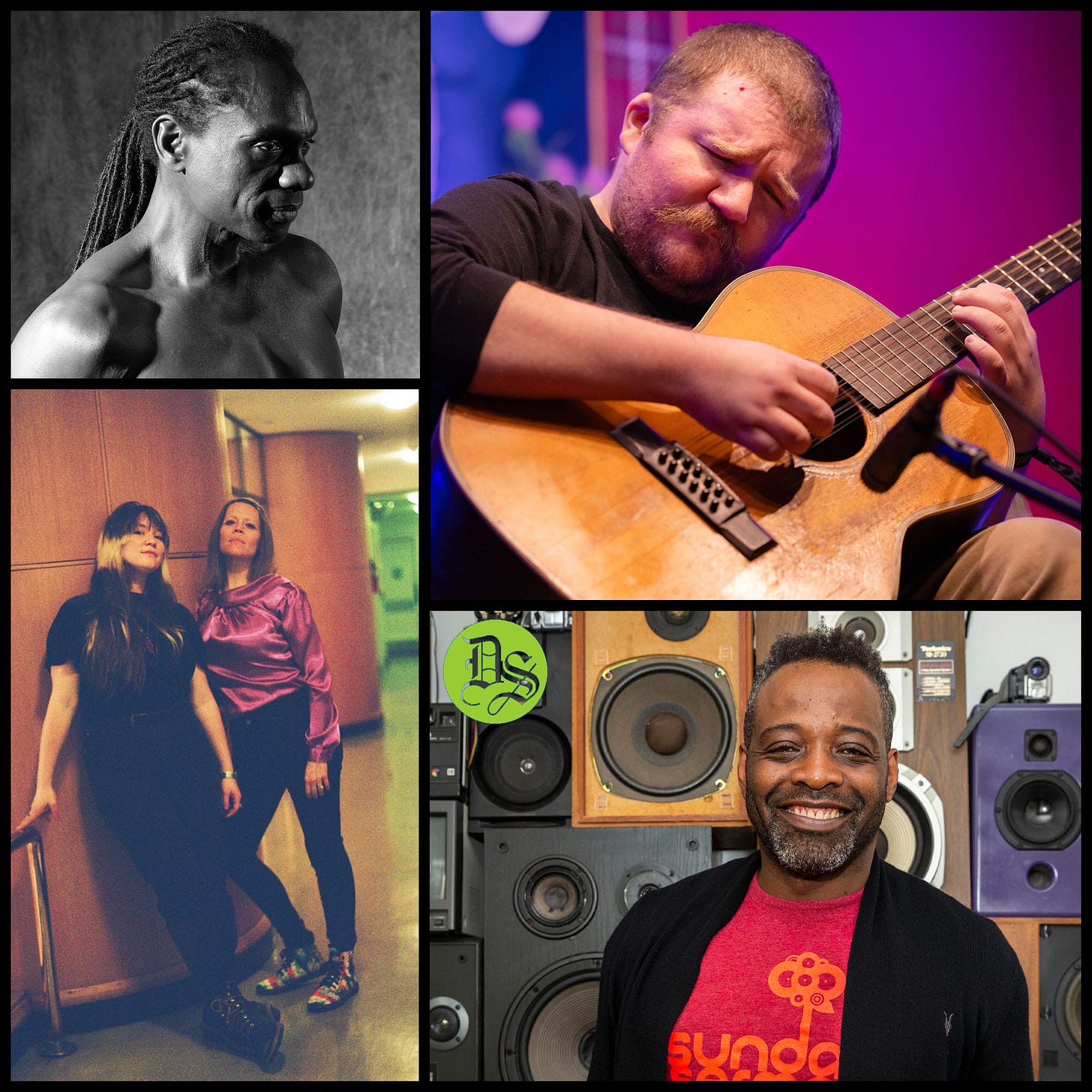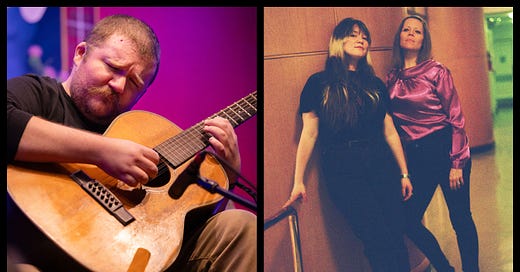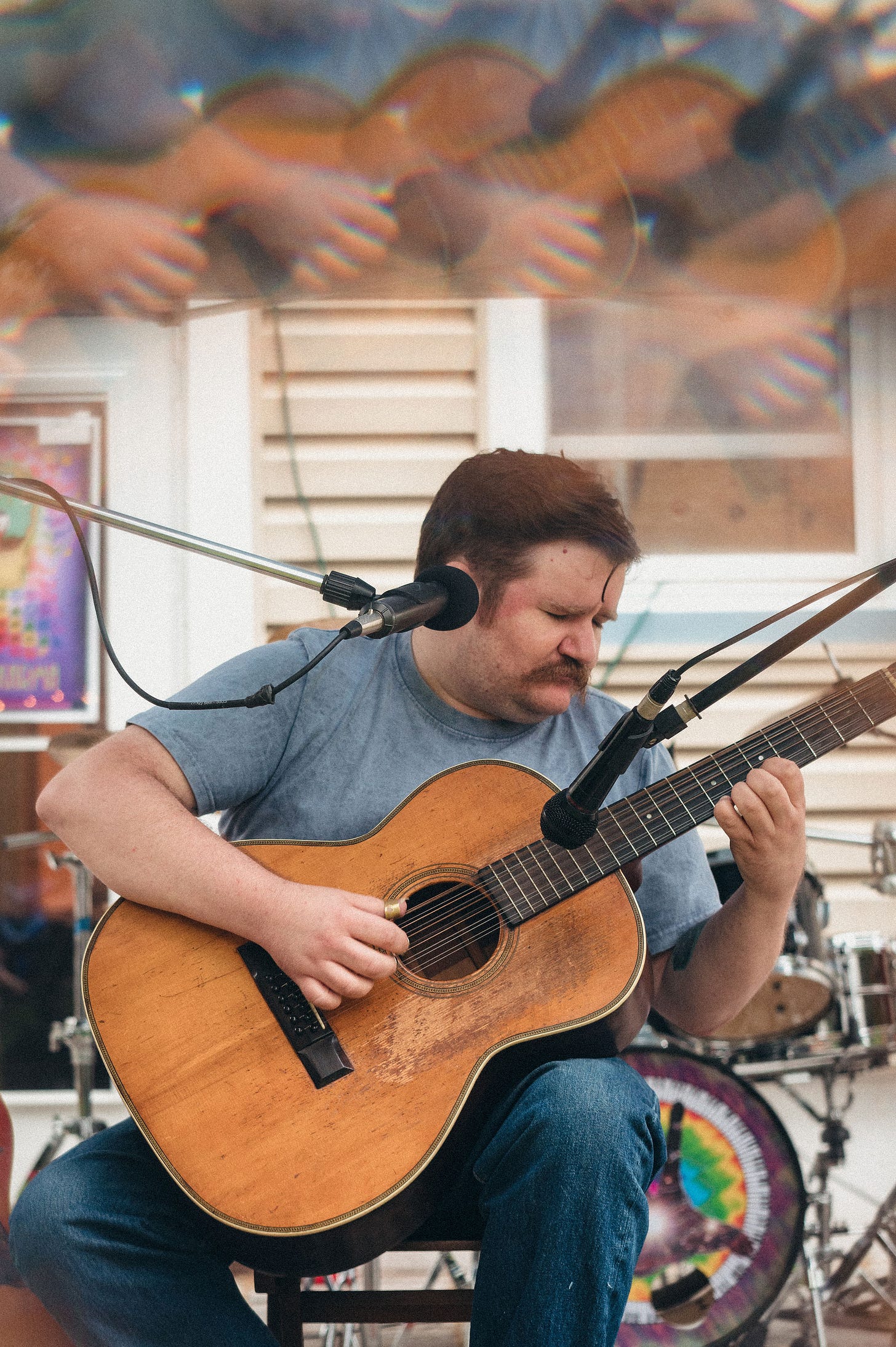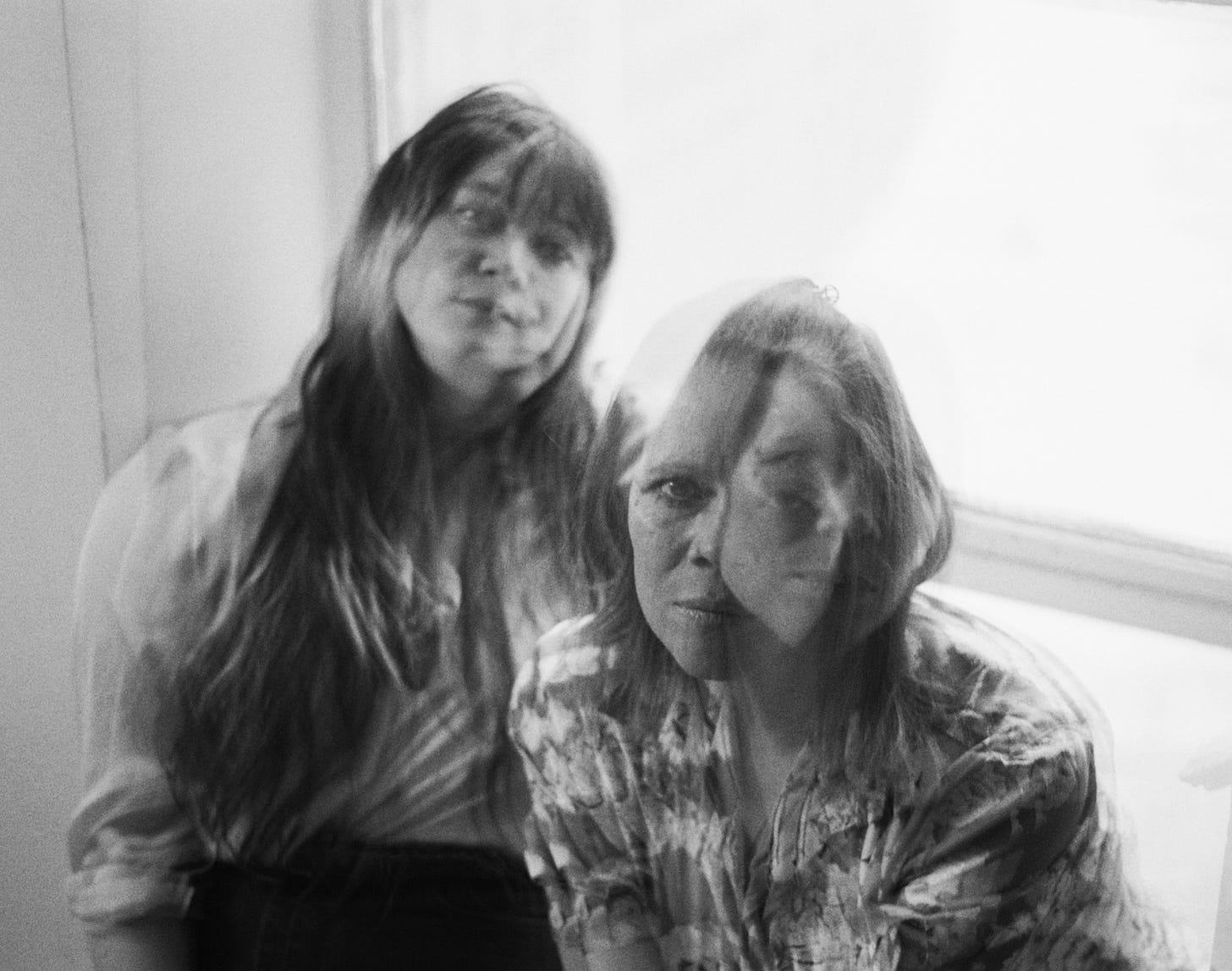Joseph Allred, Caroline Davis & Wendy Eisenberg In Their Own Words | Bklyn Sounds 8/8/2024—8/13/2024
Two short Q&As with artists performing live @ Dada Strain show on Sunday Aug 11th + This Week's Shows include Timmy Regisford's Shelter / 'Sundae Sermon' / Plumb / Obscuress / much more

This Sunday, August 11th, Dada Strain is producing its last live show of the summer at the Light and Sound Design Studios loft in Greenpoint. The early-evening double-bill will feature Joseph Allred, a folk-oriented singer-guitarist-multi-instrumentalist visiting Bklyn from North Tennessee, and the duo of Caroline Davis and Wendy Eisenberg, playing saxophone and guitar (respectively) and singing their off-kilter art-pop improvisations-turned-songs. If you’re unfamiliar with any of them but value roots and improvisation, or recognize how relationships to/with/in music help foster new ideas, I think you’ll love what they all do. As always, for folks unfamiliar with musicians that Dada Strain books, I emailed the artists a few questions. Enjoy!
Joseph Allred
I was not aware of Joseph Allred’s body of work until last February, when I was asked to write some short biographies for the program guide of the Big Ears festival in Knoxville, and Joseph’s name was on the list. So I started researching and listening. What I discovered was an incredible guitar player in the John Fahey vein, mixing folk, blues and spirituals with long-form drones, who’d been releasing their own work for over a decade. Allred lives in rural Tennessee, just below the Kentucky state line, a pastoralist who paints the artwork, books the gigs, records and works mostly on their own, as DIY as they come. The music I heard was gorgeous, the story I began learning was fascinating, especially for a lifelong city dweller always curious as to how tradition and modernity mix outside media-saturated urban environments, beyond the cliche. At Big Ears, Joseph performed a beautiful solo set in a rammed Irish pub full of guitar nerds, ending with a Robbie Basho cover accompanying themselves on the harmonium. It was one of my festival highlights. A couple of days later I reached out to Joseph on IG, saying that if they ever needed a gig in New York, I’d be honored to help. Joseph said that they might be driving through in August — so here we are.
First off, I want to ask you about your heritage and how it relates to the kind of music you make: I read that you live in a house built by your grandparents, in Crawford, TN and when I looked it up on the map, there's an Allred, TN not far away. Which leads me to believe that your family has been in the area for a long time. The music you play also sounds as though it was passed down for generations, folk and blues and spiritual progressions and verses. Tell me a bit about your family and its relationship to the traditional music of the area, and then your own relationship to the music.
My dad’s side of the family settled in Overton County, TN in the early 1800s. I list Crawford as my address since it’s where the closest post office is and it feels weird sometimes to tell people I’m from a place called Allred, but I live in Allred. Crawford is an old, planned coal-mining town on top of the mountain I live at the foot of. I grew up in Jamestown about 25 miles away. My family doesn’t have really deep musical roots in the area but there has always been a lot of music around. My dad sang in the church choir and a gospel quartet and also played my brother and I Led Zeppelin and Black Sabbath records from his collection. I think that may have given me an early fascination with the poles of “light” and “dark” when it comes to music. I rebelled against a lot of the culture I grew up in and didn’t want much to do with country, bluegrass, gospel, etc. for a long time. John Fahey’s take on American traditional music helped me re-approach it. I settled in the house I live in now in 2012 after my dad got diagnosed with cancer. The process of preparing for his death and dealing with the aftermath forced me to contend with who I am more deeply than I had before, and that also allowed me to embrace some of the music I had rebelled against for so long.
I am always curious about how time-worn traditions and the avant-garde intersect in somebody’s work. Whether that's Dvorak or John Coltrane or John Fahey, artists who take older cultural ideas and update them for modern times in a way that doesn't feel obvious or pandering. That’s how I regard your work. Can you tell me a bit about your creative process in that regard? What motivates you to look towards the past and to the future? (Or do you even consider it as looking “towards the past"?) Do you have an idea in your mind of who you are creating your work for? (Who the audience is?)
I struggle to talk too much about my creative process, but I’ve been pretty heavily influenced by the surrealist method of making art. I understand this to involve working as quickly as possible without allowing myself time to become too conscious of what I’m doing. We can gain an insight into subconscious processes that might slip away unnoticed through making art according to this method.
The attempt to free myself from projecting conscious intentions or preconceptions onto my work also comes from some strains of philosophy I’ve encountered in Buddhism. Suffering arises from our failure to recognize the “emptiness” of phenomena and the resulting tendency to project a conceptual framework that assigns a kind of fixed reality onto a world that lacks that reality. Art for me is part of a practice to gain a truer and more penetrating insight into reality. When I use the tools of traditional music, I use the most authentic and readily available tools for me. It has more to do with accepting and affirming my most authentic being than making an aesthetic choice.
On top of being a virtuoso musician, you also draw beautifully. Can you tell me whether or not you think of these two practices in the same way or completely different?
I appreciate your kind words about my visual art. I really don’t think I have any technical aptitude for it but it is very much related to my musical practice. I’ve always loved drawing on whatever surfaces were available to me (which led to me having to stay in from recess one day in 7th grade and clean all the desks in the classroom now that I think about it). But I didn’t start to take making visual art seriously at all until I started making solo records a little over a decade ago. I decided I wanted to do the artwork myself to make the whole thing a kind of single utterance. The artwork I make is a visual representation of how it feels to make the music I make, or sometimes I’ll put on an album I need to do artwork for and let the music guide me. I rarely do any painting for its own sake anymore but I’ve been feeling an inclination to do more of that.
Caroline Davis & Wendy Eisenberg
If you’re a regular reader of Bklyn Sounds, you are probably familiar with the names of saxophonist Caroline Davis and guitarist Wendy Eisenberg, whose gigs I shout-out pretty regularly. There’s a reason for that. I believe they are two of the truly vital rhythm-improvisation-community artists in a city teeming with them, skillfully collaborating with an insane cross-section of musicians across what many people call genres and traditions, projects upon projects, one-offs and long-time partnerships, leadership and ensemble roles, from hole-in-the-wall lofts and basements to the stages of cultural institutions. I long suspected Caroline and Wendy were philosophically and musically aligned, but had no idea that they were actually playing together the whole time, until a wonderful sweaty gig at Red Hook’s 360 Record Shop last August. The skronky instrumental lines that wrap around each other, the melodies that fall in and out of alignment, the warmth of looking at the world with sympathetic but questioning glances that turn into songs — all of it comes together beautifully on Accept When (Astral Spirits), an album released in April which I can’t recommend enough. I interact with Caroline and Wendy casually all the time, but when asking them to answer a few questions, I wanted to zero in on their relationship, and on that record.
You're both incredibly prolific members of what I think of as the great improvised music community in Bklyn. It's got a lot of overlapping sonic cliques, but to the best of my knowledge (and my ears) you two come at this community from different directions. Can you talk a little bit about how you regard the music you make in general terms, and talk about how you found each other and started playing with one another in Bklyn. Also, where do your musical affinities overlap and where do they complement each other?
Wendy Eisenberg: I'd been a fan of Caroline's for a long time; being in the improvised music community means you end up keeping tabs on anyone in the sprawl who can approach that sprawl in any way that seems simpatico or understandable. When I moved to New York in August 2020, I did not widely broadcast that, but Caroline found out because I was moving in with our mutual friend [saxophonist] Jeremy Viner. She reached out and asked to play, and we hit it off, keeping up a mostly regular improvising duo hang, which I'd say was like 60% talking and learning about each other, 40% shredding.
Improvisation is at the core of everything I do. When I write songs, they're usually in line with something I am working on in the more classically "improvised music" space (cf Derek Bailey and Anthony Braxton and Albert Ayler, &c &c &c) that wants more attention. The continuum I run on as a musician is more about the character of the attention I give to any various discipline, rather than that I might be vacillating between any number of disciplines or genres. Improvisation as its own performance practice is fleeting, momentary, holy in that way; composition is improvisation where time works as a constitutive process rather than an in-the-moment-of-the-serve architectural effect. Though I feel Caroline has more establishment in the jazz-qua-jazz communities than I do, I believe she takes a similar approach to mine; improvisation is a precondition for all the other genres and forms of study she engages with.
Caroline Davis: About a decade ago, when I moved from Chicago to New York, I felt frustrated by how cliques were formed, not IRL but in peoples' minds. Since a lot of these ideas helped fuel the dissertation in Music Cognition that I researched for and wrote at Northwestern University, it truly was a mindf***. I worked hard (with some assistance from health professionals) to shift my thinking, seeing people more as interacting threads in a silk dress. My view is that everyone is capable of playing standards, swinging, improvising, playing openly — it just feels different for the people doing it and the people feeling it. I was happy when Wendy moved to New York, 'cause we had some conversations that veered into this direction, and created a dialogue around mutually existing concepts. That way we could both exist in various underlapping communities. We operate as improvising entities at the edges. In the cellular world, I see us as fasteners, as receptors that help bind cells to their neighboring cells.
I have been pretty fascinated by your album, Accept When. Can you tell me how playing and improvising together led to the idea that you could record a written-through album? (Since those are pretty separate practices...) In the notes, that great word "friendship" comes up a bunch. (You can kind of hear the love in the songs, in the way you harmonically come together - your instruments, your singing.) Can you maybe dive a little bit into how the development of your friendship translated to writing and recording together, to creating something that you agree on as a document of your relationship?
Caroline: Thanks Piotr, we truly appreciate your kind words, they help keep our hearts full. I think it can be difficult to write and work with other people, but the adversity of it all makes me a better person and musician. The tense moments help you get to know people better, to see what you and they both need through the process of creating beauty together. Through these few years of knowing Wendy, our friendship has seen a lot of spaces, from sitting on couches laughing together about absurdity in the music, driving in an emotion-filled car with a tumultuous storm barreling down on the windshield, dealing with promoters who don't see our potential, working through injuries, and feeling our sonic contributions to the max. I am grateful for all of it, how it transforms our mind-body, but also how it strengthens what is already there. I find love in the acceptance. I learn how to lean into it with outstretched arms.
Wendy: I think we just liked so much how we sounded, and how our approaches worked together, that we wanted to document it. What is written-through is usually an improvisation that needed more time, or wanted to be heard again. It's like how a sculpture or a painting can be considered to be another form of "complete" when it is engaged with by an audience: hearing improvisations is like watching somebody sculpt or paint the piece, whereas hearing compositions is about the composer taking a few more steps back, delaying, assessing, then allowing, then sharing.
Getting to know Caroline better has been a real pleasure, and would absolutely not have happened without the pre-existing musical compatibility and commitment to curiosity and sensitivity at all times. I think that music is one of the deepest ways friendship can take root and be expressed. I have worked in bands where the task of music-making was the only way me and some of the other musicians were friends; Caroline and I share an expansive approach to the creative process which allows the amiability of our music to find a mirror in the ways we engage each other. The best part of that dual approach is, even if the conversational or musical relationship isn't always consonant, we are always listening, always encountering each other freshly and honestly.
This Week’s Shows:
Dada Strain presents Ritmo, Improvisación, Electricidad, as part of Industry City’s summer Backyard Jam series. As the title implies, all participants are local Latinx artists who work with rhythm, improvisation and electronics, and all are deep faves. (More info here and here.) Live sets by STEFA* and A.B.E.L.A. (Asociación de Bateristas ElektrónikXs de Latinoamerika); DJ sets by Mickey Perez and Toribio before, between and after. It feels self-serving to say ‘Highest Recommendation” but the music will be killer, maybe you can help in bringing the vibe…? (Thurs 8/8, 6p @ Industry City, Sunset Park - FREE)
EDIT: UNFORTUNATTELY TONIGHT’S DADA STRAIN EVENT IS POSTPONED DUE TO THE RAIN. STAY TUNED FOR A REBOOKING!
A great NYC dancing double-bill on Lincoln Center’s grand, disco-ball-adorned plaza: Lil Louie Vega’s live band, Elements of Life, is a wonderful Latin-House-Soul-Jazz groove machine full of all-star players and vocalists, much more apropos for the disco ball than the cramped, sit-down jazz clubs they’re mostly booked into in the city. The repertoire is one dance-floor classic after another. Opening is Soul in the Horn’s mistress of ceremonies, Natasha Diggs. (Thurs 8/8, 6:30 @ The Dance Floor, Lincoln Center - FREE)
Cafe Erzulie’s long-running Jazz Night is hosting a special one: the birthday “Bash” of a musical leader-in-the-making, alto saxophonist Immanuel Wilkins, which will also feature a set or two? by his excellent quartet, with pianist Micah Thomas, bassist Rock Rosato and drummer Kweku Sumbry. Really the perfect spot outside of stuffy jazz institutions and culture mausoleums to hear (and actually dance to) Wilkins’ music. Also: DJ Purp. Highest Recommendation. (Thurs 8/8, 8p @ Cafe Erzulie, Broadway & Myrtle - $25-$40)
The messy, moving, both too-long and too-short live performances by the collection of late-70s/early-80s new music-adjacent minimalist disco-heads who make up Peter Gordon’s Love of Life Orchestra are never anything less than great adult New York fun. Bonus beat: you never know which old New York punk-era art-notables-turned-academics/writers you’ll run into in the crowd. Opening is Suss, an ambient-country trio also made up of downtown NYC veterans. (Fri 8/9, 8p @ Bowery Electric, Manhattan - $20)
Exquisite triple bill of young experimentalists already critical stars but reaching for something much bigger. Tirzah is a British singer-songwriter already with a pair of P4k BNMs who, with the help of producer Mica Levi, nurtures lo-fi electronic pop abstractions that already sound like classics. Producer Loraine James pushes her compositions and songs into more chaotic digital-rhythm spaces, with the kind of minimalist-ambient melodic-isms that used to be called IDM, and feel like soulful post-Björk work. Purelink is a trio of Chicago-to-Bklyn transplants, making jammie, techno-oriented dubs for folks who want a local ambient Echochord vibe. Highest Recommendation! (Fri 8/9, 8p @ Knockdown Center, Maspeth - $35)
Brother Adrian of the excellent Ergot Records store on 2nd & 2nd continues throwing DIY AF music events of the highest order. Obscuress is the Texas duo of veteran lo-fi experimentalists, Christina Carter (once of legendary drone guitarrorists Charalambides) and Spencer Dobbs, whose soft work has been described as "beautiful, deep, desperate, drunken late-in-the-night folk music." Together they’ve recorded a meditative beauty called Namesake, which has given them a reason to drive around the country and play. Opening is the collagist, audio-visual improviser Marcia Bassett. (Fri 8/9, 9p @ Ergot Records, East Village - $10)
Keep reading with a 7-day free trial
Subscribe to Dada Strain to keep reading this post and get 7 days of free access to the full post archives.




